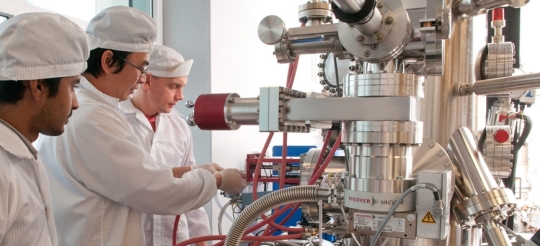Spintronics research
We make thin films of rare-earth nitrides under ultra-high vacuum for use in spintronics research. The reactive rare-earth metals, or lanthanides, form interesting complexes with nitrogen.

We have discovered that most rare-earth nitrides are ferromagnetic semiconductors with a strong coupling between electric charge and spin. This makes them ideal for development as new advanced materials.
Our films are being investigated for their use in spintronics - a new generation of electronic device where the spin of an electron is controlled, in addition to its charge. Our group is at the forefront of research in this emerging technology. Applications could see computer RAM replaced with 'non-volatile memory' which is retained when power is turned off, and produce a new generation of hard drive sensors.
We lead the world in the understanding and growth of rare-earth nitride films, and hold substantial IP protection. This position is strengthened by the international collaborations we have established to analyse the materials we make and ultimately commercialise the technology we develop.
Research funding
Previous grants from NERF (New Economy Research Fund) and the Marsden Fund, valued at $3.75 million over six years have given a 'thumbs up' to our research and will ensure a sustained effort in this area. Ongoing support of the programme is also received from the MacDiarmid Institute.
Read about our current research projects.
We are now actively recruiting postgraduate students. Please contact Ben Ruck for more information.
Head of School
School of Chemical and Physical Sciences
Associate Professor
School of Chemical and Physical Sciences



